-

人教版新目标初中英语九年级下册You’re supposed to shake hands教案
教学目标:1. 掌握本单元一些重点词汇的写法和用法。2. 学会自如谈论餐桌礼仪。Step 1 RevisionAsk some students to retell the customs at the table in France in the passage in 3a.Step 2 Self checkPart 1. Fill in each bland with the correct word given. Students do the exercises by themselves at first. Then check the answers. Ask the students to comprehend the sentences and help them point out uses of some words, like “arrive (at / in) sw., spend time / money on sth , spend time / money (in) doing sth.”Part 2. Read about Fan Ling’s experience in a western restaurant. Understand the passage. Point out some key points in the passage.1. be / get used to doing sth. 习惯做某事2. begin with = start with 以….开头3. crowd v. 挤满,塞满 the crowd 人群 crowded adj. 拥挤的Then students discuss about how she would solve her problem. Ask some to share their stories with others.Part 3. Complete the crossword by looking at the sentences on the left. Then check the answers.

人教版新目标初中英语七年级下册How was your weekend教案2篇
Teaching Goal:1. General aims:Talk about recent past events2. Particular aims:A. Language Focus.Talk about recent past events and think of the past events.B. Language goalsHow was….?It was …What did …do over the weekend?C. Language structures:(1). How was your weekend? I was great. Pay attention to no form.(2). What did you do over the weekend? I played soccer. We went to the beach.D. Useful words and phrases:Words: was, did, went, beach, over, project, test, wasn’t, false, number, geography, spend, week, most, mixture, their, had, little, cook, read, saw, change, everyone, sit, sat, no, anythingPhrases: did one’s homework, played soccer, cleaned my room, went to the beach, played tennis, went to the movies, on Saturday morning, over the weekend, cook … for, what about, do some reading, have a party, talk show, go shoppingE. Grammar language:Present simple past tenseRegular and irregular verbsF. Learning strategies:Tour and holidaysG. Interdiscipinary:H. Emotion and manner:Teaching time: 5 periodsTeaching procedures:Period One教学步骤、时间 教师活动 学生活动 媒体应用Step 1Free talk 3’ Ask some questions like:Who’s on duty today?What’s the weather like? Answer and talk about something.让同学们回答下列问题1. Do you like weekend? (Let some students answer)It takes them three minutes to talk about the question.2. Why do you like weekend? (let the students answer) Most of the students like the weekend此时教师用汉语问:“在周末期间问你干了什么?这句话用英语这么回答?Let the students guess.At last the teacher give them right answer3. What did you do over the weekend?(板书、学习)
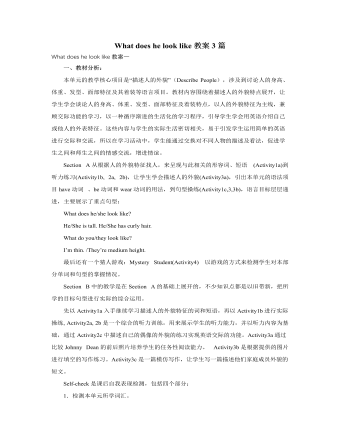
人教版新目标初中英语七年级下册What does he look like教案3篇
所需要用到的句子:Who is that?That is Jack. I like him.Why do you like him?I like him because he is interesting.Task 4: 设计理想中的人类Step one: 设计理想中的人类的外貌。把全班同学分成若干小组,学生可以边说边在纸上画出他们的模样。Step two: 设计理想中人类的性格。学生们可以把那些能描述性格的单词写在图画的旁边。Step three: 每组选出一名同学,其他同组同学提问,他作简单回答,并说明原因。所需用到的句子:What does he or she look like?He or she ...What is he or she like?He or she is ...Why?Because ...Task 5: 挑战性活动调查性格是天生的还是后天形成的,让每个同学回家去调查一下自己成长过程中性格是否有变化,具体是怎样的,为什么会这样? Teaching Aims:1. Enable students to have a general understanding of how to talk about people's physical appearance.2. Enable students to tackle some essential vocabularies and patterns about describing people. Provide them with necessary skills and methods.3. Create various chances for students to describe the persons they're familiar with, such as classmates, family members, teachers, idols, etc.

人教版新目标初中英语七年级下册Where is the post office教案2篇
Period 2 (3a----Section B 2c)Preview(Pre-task): Key points: What laAdd another information about their pen pals----their language on the cardnguage does she/he speak?She/He speaks....Does she/he have any brothers and sisters? Does she/he speak English?Preview(Pre-task): Add another information about their pen pals----their language on the cardKey points: What language does she/he speak?She/He speaks....Does she/he have any brothers and sisters? Does she/he speak English?Step 1 Revision1.Revisionand dictation of the new words 2.Revise the drills they learned yesterday.(by pairwork and grammar exercise)Step 2 Leading-inT has a conversation with one student. The conversation is following:---Do you have a pen pal?---Yes, I do.---What's your pen pal's name? ---His/Her name is....---Where is your pen pal from? ---He/She is from...---Where does he/she live? ---He/She lives in....---What language does he/she speak?He/She speaks...Write the new words on the Bb. They are following: EnglishChineseJapaneseFrenchStep 3 LearnLearn the new words with the whole class.Finish 3a with the students3b Pairwork T still does an example with one student Then the Ss practise in pairs. The example is following:--Curry Muray is my pen pal. He is from the United States.---What language does he speak?
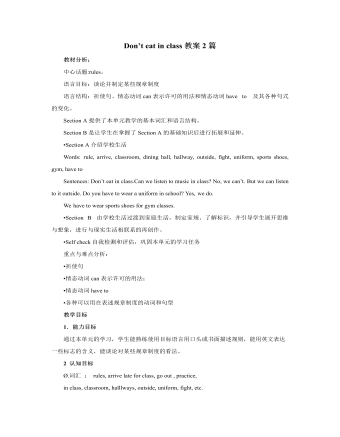
人教版新目标初中英语七年级下册Don’t eat in class教案2篇
Don’t fight. =You can’t fight. (板书,教读)教师把这些句子板书在黑板上,并请学生大声整齐地读祈使句和“can’t”句型,并让学生注意两种句型表达形式的不同和转换,“Don’t …=You can’t…”;并对学生说:These are our school rules. (板书,教读) You can’t break the school rules. Don’t break the school rules.(板书,教读)步骤3 :Practicea. T: Now, each of the students is breaking one of these rules.Please finish 1a.学生看图,完成1a的内容,检查答案并大声朗读校规。b. 听录音,完成1b,选出四位学生都违反了哪条校规;听之前,学生要读会英文名。c. 请两位学生朗读1c部分的句型;要求学生两人一组对话表演,SA扮演外校转来新生,SB告知本校校规。(学生可经过讨论,多说出他们想到的校规,不必只限于书上;教师应给予帮助)2) 第二课时(2a~4)步骤1 :warming up of revisionT: What are the rules at your school?学生使用“can”或祈使句表达各条校规;其中老师可引出“eat in the cafeteria outside”的表达。步骤2 :Practicea.T: Christina is an exchange student. She doesn’t know the rules. Let’s listen, what activities they’re talking about?学生听第一遍时,完成2a;第二遍时,完成2b;b. 请学生领读2c部分,看着2a完成的表格,理解2c活动的要求;分成小组针对2a进行问答;
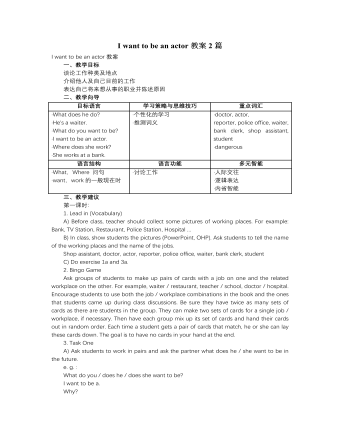
人教版新目标初中英语七年级下册I want to be an actor教案2篇
三、教学建议第一课时:1. Lead in (Vocabulary)A) Before class, teacher should collect some pictures of working places. For example: Bank, TV Station, Restaurant, Police Station, Hospital ...B) In class, show students the pictures (PowerPoint, OHP). Ask students to tell the name of the working places and the name of the jobs.Shop assistant, doctor, actor, reporter, police office, waiter, bank clerk, studentC) Do exercise 1a and 3a.2. Bingo GameAsk groups of students to make up pairs of cards with a job on one and the related workplace on the other. For example, waiter / restaurant, teacher / school, doctor / hospital. Encourage students to use both the job / workplace combinations in the book and the ones that students came up during class discussions. Be sure they have twice as many sets of cards as there are students in the group. They can make two sets of cards for a single job / workplace, if necessary. Then have each group mix up its set of cards and hand their cards out in random order. Each time a student gets a pair of cards that match, he or she can lay these cards down. The goal is to have no cards in your hand at the end.3. Task OneA) Ask students to work in pairs and ask the partner what does he / she want to be in the future.e. g. :What do you / does he / does she want to be?I want to be a.Why?Because it's (adj).B) Vocabulary: Section B, 1a4. Homework 1.2.
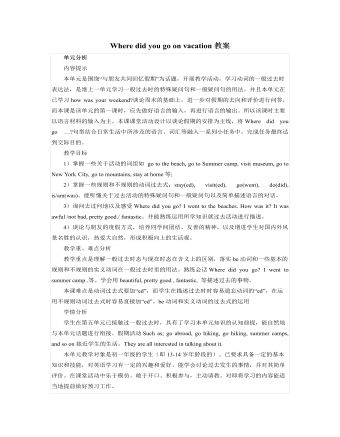
人教版新目标初中英语七年级下册Where did you go on vacation教案
句型: Where did you go on vacation? I went to summer camp.Did she go to Central Park?Yes,she did.No, she didn’t语法:一般过去时特殊疑问句、一般疑问句及肯、否定回答。课时安排4课时第一课时:Section A:la,1b,lc,2a,2b,2c 第二课时:Section A:3a,3b,4第三课时:Section B:1,2a,2b,2c第四课时:Section B:3a,3b,3c,4 and Self Check第一课时教学目标掌握描写假期生活的形容词。假期里自己所做事情的简单表达。谈论假期做的事情及当时情况。谈论假期时旅游的天气,旅游者以及食物等。教学过程一、导入播放一首英文歌曲:Let’s travel 说明:通过让学生听节奏欢快迪斯尼英语歌曲Let’s travel.引入本节课谈论的话题vacation and travel. 让歌曲使学生的思维活跃,增强课堂气氛,激发学生提高学习英语的兴趣。T:How is the trip ?Ss : It’s pretty good/ happy/exciting /relaxing/busy/dangerous/ fantastic说明:这个问题是为了操练形容词。建议让多个Ss作答。鼓励他们用不同的形容词。上述个别形容词本应在第二课时中出现,但可以在warming-up中第一次非正式出现。这些形容词也可在老师的评价语中适时出现,以加深学生对词汇的印象。
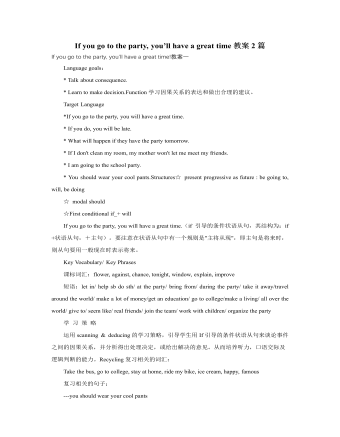
人教版新目标初中英语八年级下册If you go to the party, you’ll have a great time教案2篇
区分宾语从句、定于从句和状语从句宾语从句和状语从句,都叫做主从复合句。宾语从句主要是中考必考的,是初中阶段必掌握的从句,宾语从句主要是掌握三要素,所谓宾语从句,就是宾语在主从复合句当中充当宾语的一个句子,叫做宾语从句。主句的谓语动词是及物动词,后面如果是词或者是短语的话,是简单句,如果是句子的话,肯定是宾语从句。I know that he good at English.就是宾语从句,三要素,一要素是要注意连词,连词一共学了三类连词,一类连词是that口语当中可以省略,就像刚才说的那一句,I hear he is good at English.还有疑问代词、疑问副词,how where when,疑问代词、疑问副词。还有一类连词weather是否的意思,不是状语从句当中的如果,这一定要和如果区分开,这是是否。I don't know if he interested at English。宾语从句要注意if是连词。第二要素是语序,要用陈述举语序。比如说你家有几口人,我们都说How many people are there in you family?但是这是简单句,一旦说成宾语从句,你可以告诉我你家有几口人吗?Could you tell me how many people there are in you family ?

人教版新目标初中英语八年级下册It’s a nice day, isn’t it教案2篇
"Hello! Welcome to English class! Introduce yourself. Meet your new classmates." That's what the teacher says. What do you say? "Oh no!" It can be difficult talking to new people. But it can be fun, and you can make friends. How do you do it? Make small talk. Small talk is polite conversation. "Wang Nan is a great pingpang player, isn't she?" "I'd love to meet her, wouldn't you?" "It's been raining a lot, hasn't it?" Tag questions are a form of polite speech. To make small talk successfully, you should know how to make them. You should also know what topics to talk about. Try to learn this unit carefully. The next time you're in English class, you'll find out. Making small talk's easy, isn't it? (“你好!欢迎你!请做一下自我介绍。认识一下你的新同学。”通常在课上老师会这样说。你会说什么呢?“噢,不!”与陌生人谈话太困难了。但是这也很有意思,并且你还能交到朋友。你该怎么做呢?闲聊。闲聊指得是礼貌的对话。“王楠是一个很棒的乒乓球运动员,不是吗?”“我希望自己能认识她,你呢?“今年的雨水很多,不是吗?”反意疑问句是一种礼貌用语。为了使得谈话成功,你应该知道怎样去进行闲聊。你还应该知道与不同的人该谈论什么样的话题。认真的学习这个单元吧,下次在英语课上,你会发现与大家展开谈话是一件很容易的事情,不信我们来试试。)

人教版新目标初中英语八年级下册He said I was hard-working教案2篇
This activity introduces some new vocabulary and provide oral practice using the target language.Task 1 . Ask four students to stand in front of the class, and the teacher asks them the following questions as a reporter.1.What are you going to do when you grow up?2.What are you going to do next week?3.What are going to do after school?The students will give different answers, then ask a good student to report what they said.I am going to e a doctor.What did she say?----------She said she was going to be a doctor.I am going to have a party on Friday night.What did he say?-------He said he was going to have a party on Friday night.I am going to do my homework.What did she say ?------ She said she was going to do her homework.I am going home after school.What did she say?-----She said she was going home after school.Say In this unit we are going to learn to use words like to report what someone said.Task 2. Read the instructions. Then ask a student to read the four questions. And write the words on the Bb. Explain what soap opera is.Task 3. Ask the students to Look at the pictures, point out the TV screens in the picture. Ask one girl to read what Marcia said.What did Marcia say? She said She said she was having a surprise party for Lana on Friday night. Repeat the other pictures in the same way.Activity3. Listen and number the pictures in activity 1a.

人教版新目标初中英语九年级下册Rainy days make me sad教案
1. 教材分析本单元以how do things affect you?为话题, 从颜色、天气、音乐、广告、产品等方面谈论了外界事物如何影响人的心情。要求学生掌握表达某物或某事给人带来的感觉、看法或影响等。共设计了四个部分的内容:Section A 该部分有4个模块:第一模块围绕Which restaurant would you like to go to?这一话题展开思维(1a)、听力(1b)、口语(1c)训练;第二模块围绕How does music affect you? 进行听力(2a-2b)、口语训练(2c);第三模块继续围绕how do colors in the restaurant affect you这一话题展开训练,训练形式为阅读和问题体验(3a)和小组活动(3b);第四模块仍就How do things affect you这一话题以调查的形式展开讨论。Section B该部分有4个模块:第一模块围绕产品广告对人们的影响这一话题以“配对”(1a)与“列举”(1b)两种形式展开训练;第二模块继续围绕How do things affect you? 进行听力(2a-2b)、口语对话训练(2c);第三模块围绕“Advertising”这一话题展开阅读(3a-3b)和写作(3c)训练;第四模块围绕How posters affect you这一话题以口语训练形式展开小组活动。

初中历史与社会人教版九年级下册《地球一小时 活动》教材教案
地球一小时(Earth Hour)是世界自然基金会(WWF)应对全球气候变化所提出的一项倡议,希望家庭及商界用户关上不必要的电灯及耗电产品一小时。来表明他们对应对气候变化行动的支持。过量二氧化碳排放导致的气候变化目前已经极大地威胁到地球上人类的生存。公众只有通过改变全球民众对于二氧化碳排放的态度,才能减轻这一威胁对世界造成的影响。地球一小时在3月的最后一个星期六20:30~21:30期间熄灯。活动由来:“地球1小时”也称“关灯一小时”,是世界自然基金会在2007年向全球发出的一项倡议:呼吁个人、社区、企业和政府在每年三月最后一个星期六20:30~21:30期间熄灯1小时,以此来激发人们对保护地球的责任感,以及对气候变化等环境问题的思考,表明对全球共同抵御气候变暖行动的支持。这是一项全球性的活动,世界自然基金会于2007年首次在悉尼倡导之后,以惊人的速度席卷全球,大家都来参加这个活动。[1] “地球1小时”活动首次于2007年3月31日在澳大利亚的悉尼展开,一下子吸引了超过220万悉尼家庭和企业参加;随后,该活动以惊人的速度迅速席卷全球。在2008年,WWF(中国)对外联络处透露,全球已经有超过80个国家、大约1000座城市加入活动。2013年,包括悉尼歌剧院、帝国大厦、东京塔、迪拜塔、白金汉宫在内的各国标志性建筑也在当地时间晚八点半熄灯一小时。[2] ,其中包括巴勒斯坦、法属圭亚那、加拉帕戈斯群岛、卢旺达、圣赫勒那岛、苏里南、突尼斯等首次参与“地球一小时”的国家和地区。在中国,北京鸟巢、水立方、世贸天阶等标志性建筑同时熄灯,同一时段,从上海东方明珠到武汉黄鹤楼,从台北101到香港天际100观景台,中国各地多个标志性建筑均熄灯一小时,全国共有127个城市加入“地球一小时”活动。
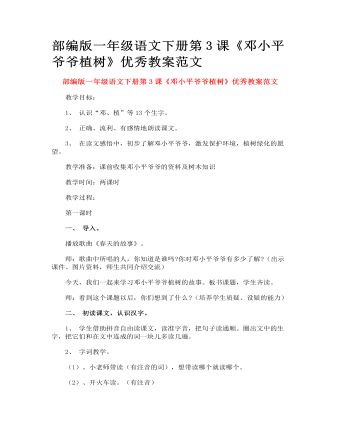
部编版一年级语文下册第3课《邓小平爷爷植树》优秀教案范文
读文感悟。 1、出示:邓小平爷爷( )地种柏树。 师:同学们带着这个问题仔细读课文,用“——”划出有关句子。然后想一想,“( )”里填什么词比较恰当。 2、生自由读课文,边读边划。 3、 全班汇报交流。 师:你认为邓小平爷爷( )地种柏树,从哪些地方体现出来? (以读为主,引导学生学会读课文,尊重学生个性化的理解。“( )”里可填“起劲、仔细、认真、一丝不苟、小心”等等,随机进行读文,结合语言文字训练,体会邓小平爷爷积极为祖国绿化作贡献的精神。) (如:找出邓小平爷爷种树的动作词“挖、挑选、移、填、站在、扶正”,同桌伙伴,一人做动作,一人口述植树过程。“移”字可换“放”字比较理解。) 4、 四人小组讨论:邓小平爷爷为什么种树?他是怎么想的? (结合课前收集的邓小平爷爷的资料理解,体会邓小平爷爷一心为国之心,激发学生参与绿化的热情。)
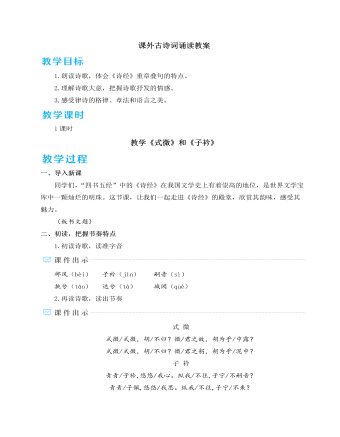
人教部编版语文八年级下册课外古诗词诵读教案
预设 “海内存知己,天涯若比邻”一反送别诗伤感悲戚的格调,体现出高远的志趣和旷达的胸怀,表明诚挚的友谊可以超越时空。此句蕴含哲理,给人以莫大的安慰和鼓舞,因此成为远隔千里的朋友间表达深情厚谊的名句。设问3:“气蒸云梦泽,波撼岳阳城”中的“蒸”和“撼”换成“滋”和“摇”好不好?为什么?预设 不好。“蒸”是蒸腾的意思,形象地描绘了洞庭湖雾气蒸腾、湖面浩渺的画面;“撼”是摇撼的意思,描绘出了洞庭湖波涛汹涌似要撼动岳阳城的雄伟壮阔的景象,且“撼”还能传达出诗人面对湖水时心胸似乎也被震荡,从而想要建功立业的主观感受。如果换成“滋”和“摇”则显得境界小、力度弱,没有这样的气势和表达效果。【设计意图】此环节主要采用问题引领的方式,一步步引导学生品味诗歌中的名句和富有表现力的字词,感受古人炼字的智慧,从而更加深入地理解诗歌情感和艺术手法。
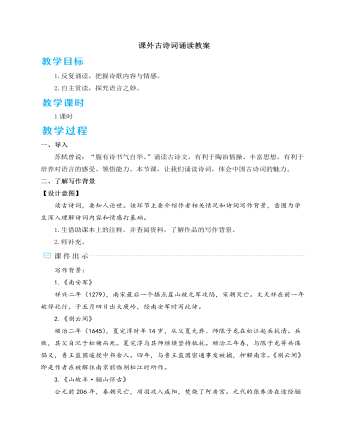
人教部编版语文九年级下册课外古诗词诵读(1)教案
《朝天子·咏喇叭》:这篇散曲借咏喇叭,讽刺和揭露了明代宦官作威作福、鱼肉百姓的罪恶行径,表达了对宦官专横跋扈、趾高气扬嘴脸的强烈憎恶之情。(2)根据上面的分析,适当运用轻重音、升降调等朗读技巧,有感情地反复朗读。(3)这几首诗词曲中,你最喜欢哪几句?说说你喜欢的理由,而后有感情地诵读。预设 【示例一】我喜欢“山河千古在,城郭一时非”。这两句以祖国山河万世永存与城郭一时沦陷进行对比,突出诗人对收复大宋江山的信念和对元人的蔑视。【示例二】我喜欢“无限山河泪,谁言天地宽”。从这两句我感受到了作者的满腔悲愤。作者一直盼望明王朝东山再起,可时运不济,命运多舛,恢复国土、重整山河的宏愿一次次落空,令作者感到深深的失望。【示例三】我喜欢“赢,都变做了土;输,都变做了土”。这两句揭示了深刻的道理,意为国家间无论怎样争斗,终究会在历史的长河中渐渐湮灭,在无尽的沧桑中被遗忘,化为沉寂的黄土。经过前面的诵读、品读环节,学生们对这几首诗词已经有了了解,再安排学生背诵,可以使学生印象更深。
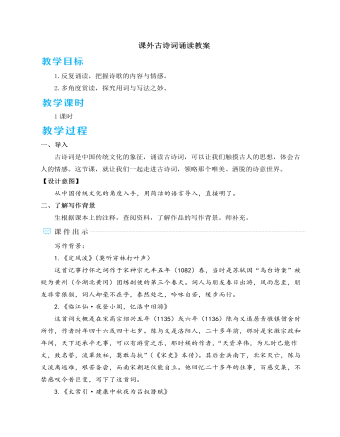
人教部编版语文九年级下册课外古诗词诵读(2)教案
【示例二】我喜欢“斫去桂婆娑,人道是,清光更多”。这里的“桂婆娑”指带给人民黑暗的婆娑桂影,它不仅包括南宋朝廷内外的投降势力,也包括了金人的势力。作者在这一句中,运用神话传说,以超现实的奇思妙想,表达渴望扫除黑暗,让光明普照人间的愿望。【设计意图】在这一环节,引导学生先理解词作的意思和情感再诵读,加深学生对词作的印象,提升学生对词作的诵读感悟能力。五、反复诵读,默写诗词1.学生独立背诵。2.同桌互相检查背诵。3.开展背诵比赛。4.集体默写四首词。结束语:诵读古诗词,可以陶冶我们的情操,激发我们的想象力,与古人对话。希望同学课下能自主阅读一些经典古诗词,在感受它们魅力的同时提升我们的文学素养。【设计意图】在前面几个环节,学生已经从不同层次诵读了四首词,对这四首词有了一定的理解。本环节让学生在此基础上用不同方式背诵,加深记忆。
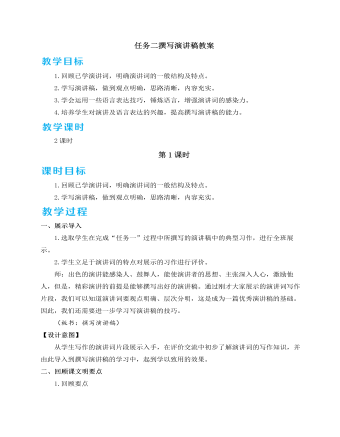
人教部编版语文八年级下册任务二撰写演讲稿教案
[乙]爱是人世间最完美的一种情感,爱就像一缕冬日里的阳光,能让饥寒交迫的人感到温暖;爱就像一泓沙漠中的清泉,能使濒临绝境的人看到希望;爱就像一盏黑暗中的路灯,能让迷惘的人找到方向。我们要让爱永驻心中,哪怕只是对父母的一句“我爱你们”、对朋友的一句“加油”、对摔倒老人的一次伸手。多一份行动,多一份传递,多一种信念,尽自己的微薄之力去帮助他人,回报社会,让爱的种子飞得更远更广,永远地扎根于人们的心中!(生交流讨论)预设 乙结尾运用了比喻、排比等修辞手法,语言更加生动,富于表现力,尤其是排比句的运用,使得句式整齐、有气势,情感表达有感染力。另外,结尾段不断重申观点,也起到了加深听众印象的效果。师:除了运用修辞手法之外,根据演讲稿的特点,我们还可以从哪些方面锤炼语言来增强演讲的表达效果呢?(生结合演讲稿的特点,讨论交流)预设 (1)运用一些口语、大众化的语言,拉近与听众的距离。(2)多用短句,少用结构复杂的长句,使语意清晰,简短易懂。
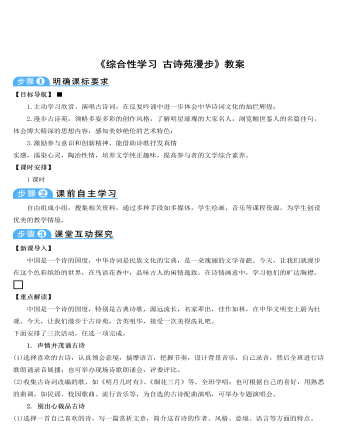
部编版语文八年级下册《综合性学习:古诗苑漫步》教案
【目标导航】1.主动学习欣赏、演唱古诗词,在反复吟诵中进一步体会中华诗词文化的灿烂辉煌;2.漫步古诗苑,领略多姿多彩的创作风格,了解明星璀璨的大家名人,浏览醒世鉴人的名篇佳句,体会博大精深的思想内容,感知美妙绝伦的艺术特色;3.激励参与意识和创新精神,能借助诗歌抒发真情实感,濡染心灵,陶冶性情,培养文学纯正趣味,提高参与者的文学综合素养。【课时安排】1课时自由组成小组,搜集相关资料,通过多种手段如多媒体,学生绘画,音乐等课程资源,为学生创设优美的教学情境。【新课导入】中国是一个诗的国度,中华诗词是民族文化的宝典,是一朵瑰丽的文学奇葩。今天,让我们就漫步在这个色彩缤纷的世界,在鸟语花香中,品味古人的闲情逸致,在诗情画意中,学习他们的旷达胸襟。
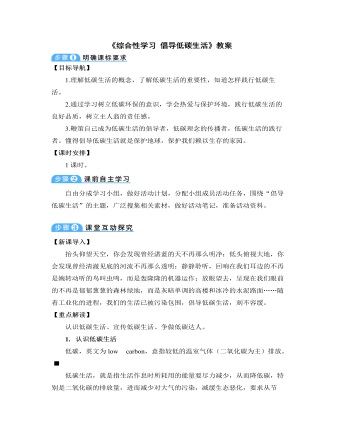
部编版语文八年级下册《综合性学习:倡导低碳生活》教案
【新课导入】抬头仰望天空,你会发现曾经湛蓝的天不再那么明净;低头俯视大地,你会发现曾经清澈见底的河流不再那么透明;静静聆听,回响在我们耳边的不再是婉转动听的鸟叫虫鸣,而是轰隆隆的机器运作;放眼望去,呈现在我们眼前的不再是郁郁葱葱的森林绿地,而是灰暗单调的高楼和冰冷的水泥路面……随着工业化的进程,我们的生活已被污染包围,倡导低碳生活,刻不容缓。【重点解读】认识低碳生活、宣传低碳生活、争做低碳达人。1. 认识低碳生活低碳,英文为low carbon,意指较低的温室气体(二氧化碳为主)排放。低碳生活,就是指生活作息时所耗用的能量要尽力减少,从而降低碳,特别是二氧化碳的排放量,进而减少对大气的污染,减缓生态恶化,要求从节水、节电、节气和回收四个环节来改变生活细节。
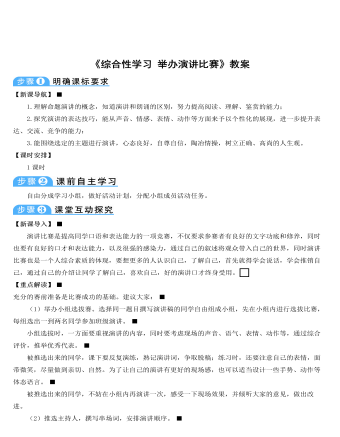
部编版语文八年级下册《综合性学习:举办演讲比赛》教案
【新课导入】演讲比赛是提高同学口语和表达能力的一项竞赛,不仅要求参赛者有良好的文字功底和修养,同时也要有良好的口才和表达能力,以及很强的感染力,通过自己的叙述将观众带入自己的世界,同时演讲比赛也是一个人综合素质的体现,要想更多的人认识自己,了解自己,首先就得学会说话,学会推销自己,通过自己的介绍让同学了解自己,喜欢自己,好的演讲口才终身受用。【重点解读】充分的赛前准备是比赛成功的基础。建议大家:(1)举办小组选拔赛。选择同一题目撰写演讲稿的同学自由组成小组,先在小组内进行选拔比赛,每组选出一到两名同学参加班级演讲。小组选拔时,一方面要重视演讲的内容,同时要考虑现场的声音、语气、表情、动作等,通过综合评价,推举优秀代表。





